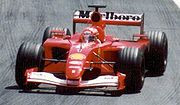
The Perfect Highway Speed
Law makers in Spain are currently thinking about increasing the maximum speed limit on Auto-vias and Auto pistas to 140 kph. I am absolutely appalled that this is even a suggestion, let alone a serious consideration. The country has reason to rejoice at the falling death rate on the highway, which can only be the credit of drivers slowing down and taking greater care. Then the government come along with this crazy scheme to increase the speed limit.
A lot of people have been taking the liberty of driving at 140 when they should have been content with 120. If the government make the speed limit 140, can we expect that people will drive at 160? Of course we can! The death toll in 2009 was 1,897, the first time that it had been less than 2,000 people. Am I missing something here? Is the government so concerned about over crowding on the streets that they rely on a certain number of people to actually die on the roads.
The logic seems to run contrary to normal and rational thinking. Why do we need to drive at 140 kph? We can always arise a little earlier from our beds and leave home a little earlier to make it to work on time. We can better organise our day to allow travelling time. We don’t have to make up time on the highway. Simply put, we don’t have to drive that fast. Drivers have been slowing down and that has resulted in fewer deaths on the road. I really hope that common sense will prevail and that this senseless idea be defeated in the legislature.
Law makers in Spain are currently thinking about increasing the maximum speed limit on Auto-vias and Auto pistas to 140 kph. I am absolutely appalled that this is even a suggestion, let alone a serious consideration. The country has reason to rejoice at the falling death rate on the highway, which can only be the credit of drivers slowing down and taking greater care. Then the government come along with this crazy scheme to increase the speed limit.
A lot of people have been taking the liberty of driving at 140 when they should have been content with 120. If the government make the speed limit 140, can we expect that people will drive at 160? Of course we can! The death toll in 2009 was 1,897, the first time that it had been less than 2,000 people. Am I missing something here? Is the government so concerned about over crowding on the streets that they rely on a certain number of people to actually die on the roads.
The logic seems to run contrary to normal and rational thinking. Why do we need to drive at 140 kph? We can always arise a little earlier from our beds and leave home a little earlier to make it to work on time. We can better organise our day to allow travelling time. We don’t have to make up time on the highway. Simply put, we don’t have to drive that fast. Drivers have been slowing down and that has resulted in fewer deaths on the road. I really hope that common sense will prevail and that this senseless idea be defeated in the legislature.
The best highway speed both for fuel efficiency and control is 90 kph. Every ten kilometres above that control decreases by a quatum jump, as does fuel consumption due to more wind pressure generated against the vehicle. I say "it ain't broke so stop trying to fix it!"
My conclusion as to the intent of the suggested new legislation is that the government must actually want us to kill ourselves on the highways of Spain. Everything else that they say and do seems to be just politics.
The question now is whether we drivers will take the bait? Personally I rarely drive at 120 kph.
Copyright © 2010 Eugene Carmichael
My conclusion as to the intent of the suggested new legislation is that the government must actually want us to kill ourselves on the highways of Spain. Everything else that they say and do seems to be just politics.
The question now is whether we drivers will take the bait? Personally I rarely drive at 120 kph.
Copyright © 2010 Eugene Carmichael



























